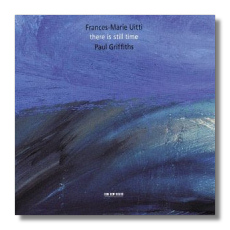
The Internet's Premier Classical Music Source
Related Links
- Latest Reviews
- More Reviews
-
By Composer
-
Collections
DVD & Blu-ray
Books
Concert Reviews
Articles/Interviews
Software
Audio
Search Amazon
Recommended Links
Site News
 CD Review
CD Review
there is still time

Scenes for Speaking Voice and Cello
Frances-Marie Uitti, cellos
Paul Griffiths, voice
ECM New Series 1882 476241-1 DDD 55:19
Subtitled "scenes for speaking voice and cello," there is still time is a collaboration between avant-garde cellist Frances-Marie Uitti and Paul Griffiths, a prominent fiction writer, as well as a commentator on modern classical music. Griffiths has taken the 482 different words spoken by Ophelia in Shakespeare's Hamlet, and arranged and rearranged them into a series of short monologues or poems. Griffiths was stimulated by the idea of constraining his vocabulary in this manner, and the resulting character (not Ophelia, although also not someone you would want sitting next to you on the bus to Cleveland for eight hours) is clearly on edge – "imprisoned" and "constantly knocking against the wall," in Griffiths' own words. Indeed, this cycle of 17 pieces – four of them for solo cello - seems to chart an already fragile character's descent into abject madness. (Before I read more about there is still time, I was half-convinced I was hearing a setting of texts by Samuel Beckett.) Uitti provides a claustrophobic, confrontational, and sometimes grating counterpoint to Griffiths' text. It is not "musical" in the traditional sense, but it works well in this context. Uitti uses not only a traditional cello, but also its electric cousin. She also has the astonishing ability to hold two bows in the same hand, giving her music a polyphonic density not otherwise available. The creators are quick to point out that Uitti is not merely accompanying Griffiths; their contributions are of equal importance.
With the material's edginess, even nervousness, there is still time is atypical for the label. (It would be perfect for the Mode label, though – home to much of John Cage's and Morton Feldman's experimental music.) I found there is still time to be an ear-opening and very stimulating experience, albeit not an easy one. Griffith's text – there is an emphasis by repetition on words such as "fear," "touching," and "bells" – is genuinely disturbing, and Uitti has found the perfect aural equivalent to the text's creeping dread. Griffiths reveals himself to be a fine actor, and Uitti's playing is in a class of its own. (Maliciously, I wonder what she sounds like when she plays the Dvořák Cello Concerto.) Kudos to ECM New Series for trying something different, particularly in an era where playing it safe is a most important survival tactic.
Copyright © 2005, Raymond Tuttle




















